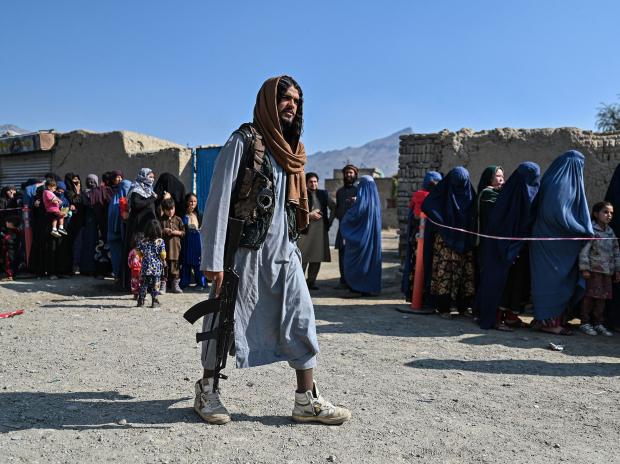Who are Taliban?
The Taliban was founded in Kandahar province of southern Afghanistan by Mullah Mohammad Omar, a mujahideen commander in 1994. It drew members from mujahideen fighters that helped push the Soviets out of the country in 1989.
The group’s name, which means “students” in the Pashto language, is a reference to the founding members having studied under Mullah Omar.
With about 50 followers in 1994, the faction fought for control of Afghanistan during the post-Soviet-era civil war.
In a span of two years, the Taliban captured Kandahar and took control of Kabul in 1996 and swiftly imposed strict Islamic rules. It ruled Afghanistan from 1996 until being toppled by US forces in 2001 following September 11 terrorist attacks in the United States, which killed nearly 3,000 people.
Taliban sheltered Osama bin Laden, the mastermind behind September 11, 2001 terrorist attacks in America, and refused to hand over Laden to US after which, American military forces invaded Kabul through air strikes and toppled Mullah Omar’s government.
The group’s founder and other Taliban leaders retreated to remote places while they planned campaigns to regain power in Afghanistan.
What is Taliban Ideology?
When the Taliban was in power from 1996-2001, it imposed a strict version of 'sharia' law in Afghanistan.
The group introduced or supported punishments such as public executions of convicted murderers and adulterers, and amputations for those found guilty of theft. Men were required to grow beards and women had to wear the all-covering burqa.
The Taliban also banned television, music, and cinema, and disapproved of girls aged 10 and over going to school. Taliban brutal and repressive rule stripped women of virtually all rights.
International recognition of Taliban
Only a few countries, including Pakistan, Saudi Arabia and United Arab Emirates recognised the legitimacy of the Taliban government during its rule from 1996-2001.
The quest for diplomatic and political recognition has been a constant in the Taliban’s struggle from the beginning through the Doha agreement of February 29, 2020, and beyond. It was made clear to the Taliban negotiators during Doha peace talks that the desired recognition could only come if they disassociated themselves completely from al-Qaeda.
While the United States and the United Nations imposed sanctions on the Taliban, and the majority of countries have shown little signs that it will recognise the group diplomatically.
Meanwhile, China and Russia are already moving to build ties with the Taliban and have hosted Taliban officials even before the US military completed its troop withdrawal.
Resurgence of Taliban
On February 29, 2020, The US and the Taliban signed an "agreement for bringing peace" to Afghanistan after more than 18 years of conflict, under the Trump administration.
Under the agreement, the US and Nato allies agreed to withdraw all troops within 14 months if the Taliban upheld the deal. Taliban also agreed not to allow al-Qaeda or any other extremist group to operate in the areas they control.
Honouring the deal, the US and other international forces started withdrawing, in June by which time the Taliban already controlled large parts of the country. But after August 6, the advancement took another turn and the group swept across Afghanistan, taking control of all major cities.
President Ashraf Ghani fled the country and the Afghan forces were bundled in lightning speed, shocking much of the international community. As President Ghani fled the country, US embassy staff were rescued by helicopters out of their heavily fortified compound.
The US drew flak for its decision to withdraw forces from the war-ravaged country, leaving the citizens in a catastrophic situation but US President Joe Biden said he stands squarely behind the decision.

 Mike Pompeo slams Ashraf Ghani in his book, calls him a total fraud'
Mike Pompeo slams Ashraf Ghani in his book, calls him a total fraud'
 Aid will be affected: UN on ban on female employees at NGOs by Taliban
Aid will be affected: UN on ban on female employees at NGOs by Taliban
 Taliban to set new rules on Afghan women's aid work: UN officials
Taliban to set new rules on Afghan women's aid work: UN officials
 Top UN woman urges Muslim nations to move Taliban back to 21st century
Top UN woman urges Muslim nations to move Taliban back to 21st century
 Freezing weather in decade's 'coldest winter' kills 124 in Afghanistan
Freezing weather in decade's 'coldest winter' kills 124 in Afghanistan
 Reviewing engagement with Taliban, says US on rights violations in Afghan
Reviewing engagement with Taliban, says US on rights violations in Afghan
 UN says Taliban divided on restoring women's rights post official visit
UN says Taliban divided on restoring women's rights post official visit
 UNSC unity key in wake of women's rights violations by Taliban: UN aide
UNSC unity key in wake of women's rights violations by Taliban: UN aide
 OIC asks Taliban to reconsider ban on women from working for NGOs
OIC asks Taliban to reconsider ban on women from working for NGOs
 Taliban's ban on women workers hits vital international aid for Afghans
Taliban's ban on women workers hits vital international aid for Afghans
